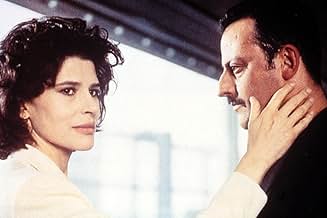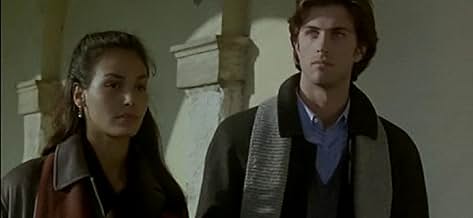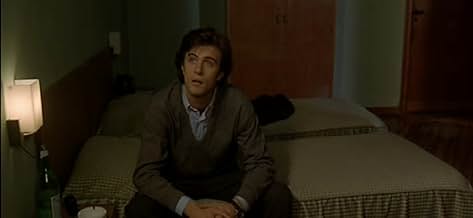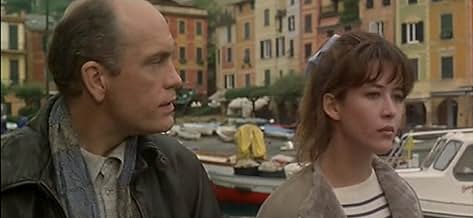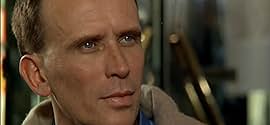CALIFICACIÓN DE IMDb
6.4/10
6.4 k
TU CALIFICACIÓN
Cuatro historias sobre relaciones cortas o largas entre hombres y mujeres en Italia y Francia.Cuatro historias sobre relaciones cortas o largas entre hombres y mujeres en Italia y Francia.Cuatro historias sobre relaciones cortas o largas entre hombres y mujeres en Italia y Francia.
- Dirección
- Guionistas
- Elenco
- Premios
- 3 premios ganados y 6 nominaciones en total
Kim Rossi Stuart
- Silvano
- (as Kim Rossi-Stuart)
Inés Sastre
- Carmen
- (as Ines Sastre)
Opiniones destacadas
I was stunned by this film. I have been renting Antonioni's films/rediscovering them, and this film showed me the climax and fruits of his 50 years of directing. What an eye for setting, color, and detail! I have never seen such visual beauty and poetry filmed before. I had to stop after the first story and hold back the tears. Yes, beauty moves me, like it moved Keats to write Ode on a Grecian Urn. This movie is made for the mature, emotionally and intellectually, audience. Those hoping to see physical action and soap opera will be disappointed. I will have to see this film several times before I can truly appreciate it and judge it. This film should be required viewing for all cinematographers and directors.
Possibly a truly great film, on the order of Kurosawa's Dreams.
Possibly a truly great film, on the order of Kurosawa's Dreams.
Michelangelo Antonioni is one of the major figures of cinema history, even if most people haven't heard of him. He was nowhere near as prolific as filmmakers such as Fellini, Godard, Bergman, Kurosawa, or Truffaut. And his films now are difficult to procure. There are only a few readily available, and I have seen all of those but one (Il Grido, which has recently been released on DVD by Kino). Four of the five Antonioni films that I've seen, L'Avventura, Red Desert, Blowup, and The Passenger are among the best films ever made. One other that I've seen, L'Eclisse, I think probably is also to be included among them; if only the video that I saw would not have been so horribly defiled! Now I have seen Beyond the Clouds.
I had always heard that it was a great failure, but it was difficult to lower my expectations of Antonioni. Wim Wenders' presence did not help, either. Throughout the film, there were many things that annoyed me, and also many things that I loved. I think a pros/cons list will help here.
Cons:
1. The writing seems weak. All the stories told have little depth, it seems, and we find out almost nothing about anybody we meet in the picture. Usually, Antonioni's writing can be used to show just how well a film can be written, and his characters are the definition of "complex." But in another way I can also see the style of writing presented here in a more positive light, which I'll comment on later.
2. The acting is really weak. I cannot in any way defend it. There is not one performer who isn't subpar here, and most of the actors are second-rate actors in the first place (Irene Jacob excepted). John Malkovich is one of the hammiest actors who's ever lived. The only thing I ever liked him in was Being John Malkovich, because that film delightfully (and, apparently, unnoticeably, at any rate by Malkovich himself) mocked his very pretensions, which are in full force in this film.
3. Casual nudity - okay, no one on Earth wants to see John Malkovich buck naked. Fortunately, if you are a fan of female nudity, nearly every woman in the film, including Bond girl Sophie Marceau, appears naked from head to foot with everything in between (sorry, Irene Jacob fans, no nudity from her!). I myself don't mind nudity when it is called for, like in Last Tango in Paris, but the rampant nudity in this film makes it seem like European softcore along the lines of Emmanuel. Actually, the softcore it really reminded me of was Red Shoe Diaries. The light jazz by Van Morrison just adds to this effect. Antonioni was once a proto-feminist. Many of his most famous films were from a distinctly female point of view. And when men did take over in his films, they were very unlikable. Here, the women are often exploited.
Pros:
1. Cinematography - okay, we have two of the best visual directors of all time working on this film, the cinematography ought to be outstanding. It is, generally. There are a couple of visual moments that are absolutely spectacular, some of the best I've ever seen. This includes an ethereal scene where Malkovich explores a deserted playground on a beach. He sits on a swing, spins around in it with a shot that involves a beautifully moving camera, and then we watch a strong wind blow sand around on the beach (Antonioni loves showing the wind in his films). Another great visual scene involves a camera gliding about a spiral staircase near the end of the film.
2. Mood - The nonchalant flow of the narrative actually adds a lot of mood. The title of the film is entirely appropriate. You do feel as if you're witnessing something beyond the clouds. Certain stories are left in suspension, never to be resolved, and it feels right. By the final scene, Beyond the Clouds had nearly won me over. Still, there were too many things wrong with it to suggest it to non-Antonioni fans, but Antonioni fans owe it to themselves to see it once. 6/10
I had always heard that it was a great failure, but it was difficult to lower my expectations of Antonioni. Wim Wenders' presence did not help, either. Throughout the film, there were many things that annoyed me, and also many things that I loved. I think a pros/cons list will help here.
Cons:
1. The writing seems weak. All the stories told have little depth, it seems, and we find out almost nothing about anybody we meet in the picture. Usually, Antonioni's writing can be used to show just how well a film can be written, and his characters are the definition of "complex." But in another way I can also see the style of writing presented here in a more positive light, which I'll comment on later.
2. The acting is really weak. I cannot in any way defend it. There is not one performer who isn't subpar here, and most of the actors are second-rate actors in the first place (Irene Jacob excepted). John Malkovich is one of the hammiest actors who's ever lived. The only thing I ever liked him in was Being John Malkovich, because that film delightfully (and, apparently, unnoticeably, at any rate by Malkovich himself) mocked his very pretensions, which are in full force in this film.
3. Casual nudity - okay, no one on Earth wants to see John Malkovich buck naked. Fortunately, if you are a fan of female nudity, nearly every woman in the film, including Bond girl Sophie Marceau, appears naked from head to foot with everything in between (sorry, Irene Jacob fans, no nudity from her!). I myself don't mind nudity when it is called for, like in Last Tango in Paris, but the rampant nudity in this film makes it seem like European softcore along the lines of Emmanuel. Actually, the softcore it really reminded me of was Red Shoe Diaries. The light jazz by Van Morrison just adds to this effect. Antonioni was once a proto-feminist. Many of his most famous films were from a distinctly female point of view. And when men did take over in his films, they were very unlikable. Here, the women are often exploited.
Pros:
1. Cinematography - okay, we have two of the best visual directors of all time working on this film, the cinematography ought to be outstanding. It is, generally. There are a couple of visual moments that are absolutely spectacular, some of the best I've ever seen. This includes an ethereal scene where Malkovich explores a deserted playground on a beach. He sits on a swing, spins around in it with a shot that involves a beautifully moving camera, and then we watch a strong wind blow sand around on the beach (Antonioni loves showing the wind in his films). Another great visual scene involves a camera gliding about a spiral staircase near the end of the film.
2. Mood - The nonchalant flow of the narrative actually adds a lot of mood. The title of the film is entirely appropriate. You do feel as if you're witnessing something beyond the clouds. Certain stories are left in suspension, never to be resolved, and it feels right. By the final scene, Beyond the Clouds had nearly won me over. Still, there were too many things wrong with it to suggest it to non-Antonioni fans, but Antonioni fans owe it to themselves to see it once. 6/10
The worst segment in this very uneven sketch film is the first, a silly tale of abandonment featuring pretty boy Kim Rossi Stuart and the Lancôme model Inés Sastre. It reeks of chic and product placement. The second episode, with a bored-looking Sophie Marceau is hardly better; we can't care if she stabbed her dad six, twelve or 528 times. Sophie does have a lovely body, however, and the boutique she works in is elegant.
The triangle story is next, with Peter Weller playing a bilingual rich man with a wife (Fanny Ardant, sensational) and a mistress (Chiara Caselli, OK). Fanny's big scene has her smashing a vase then chewing out her straying hubby. She manages to be drunk, angry and horny all at once: I have never seen her act with such power. Pity that the little sequel with Jean Reno meeting Fanny in the empty apartment isn't very effective.
The last segment with Irène Jacob, a pretty girl with a big secret, is a little gem, but it feels tacked-on, not really a part of the picture.
The triangle story is next, with Peter Weller playing a bilingual rich man with a wife (Fanny Ardant, sensational) and a mistress (Chiara Caselli, OK). Fanny's big scene has her smashing a vase then chewing out her straying hubby. She manages to be drunk, angry and horny all at once: I have never seen her act with such power. Pity that the little sequel with Jean Reno meeting Fanny in the empty apartment isn't very effective.
The last segment with Irène Jacob, a pretty girl with a big secret, is a little gem, but it feels tacked-on, not really a part of the picture.
SPOILER: After the ecstatic reviews it received in the press, I found this film
disappointing. I can only imagine that the critics were being kind to an
ill, old man of 82 and overly respectful of the reputation of a once
great film director. Visually it is very attractive with beautiful shots of a lakeside
village and very atmospheric and poetic shots of alleyways and streets
in rain and mist. But when it comes to the actions and motivations of
the people in the film it is a let-down. I like to be able to believe in
and identify with the characters in a film and I couldn't do that here.
There are four stories in the film and I will mention only two - the two
that seem to me the most trite and pointless.
The first story stars two extremely good-looking newcomers to the screen
(Kim Rossi Stuart & Ines Sastre.) He stops his car to ask her the way to the nearest hotel, and because he
is so good-looking she gives him the name of her hotel. They see each
other during the day and when they retire to their rooms at night across
the landing from each other, she lies awake waiting for the knock on the
door that never comes. In the morning she leaves early without seeing
him. It is two years before they see each other again and this time
their relationship progresses a little further - they get to be naked on
the bed together. But he behaves in a very odd way indeed; for some five
minutes he runs his hands over her body within a millimetre of her skin
but without actually touching her. What she thinks is going on as she
lies there passively, feeling nothing, is anybody's guess. Then after
five minutes, still without having touched her, he gets up abruptly and
without speaking a word leaves. Is that the action of a sane man? You
wonder why he bothered to take his clothes off if he intended to do so
little. She, presumably feeling hurt and frustrated, rushes to the
window to see him walking off into the distance. They give each other a
feeble wave. End of story. John Malkovich's deep lugubrious voice-over
tells us that he behaved in this way either because of folly or pride.
Well it was certainly folly - and certainly unbelievable. Or could it
have been impotence? Could this story be saying something about the
impotence of an old man?
In another segment of the film, Malkovich's character is attracted to a
young woman (Sophia Marceau) he sees in a shop window. He can't take his
eyes off her and just stands there entranced. She reacts in the same
way. He goes into the shop and their silent fascination continues. I
felt uncomfortable for both of them. Was something momentous about to
happen? It would seem so and our interest is awakened, our expectations
aroused. But no; we are just being lead up the garden path to nowhere.
He sits outside and eventually she joins him. She tells him only one
thing about herself, that she has murdered her father by stabbing him
twelve times. Malkovich shows no surprise and the fact seems irrelevant.
They then go to her place and they have sex. But this is not the
beginning of some deep, meaningful relationship as the earlier
enchantment would lead us to suppose. Oh no. When he's had his sex he's
had enough and like the previous male protagonist, he just walks away.
Another wretched piece of behaviour and
disappointing. I can only imagine that the critics were being kind to an
ill, old man of 82 and overly respectful of the reputation of a once
great film director. Visually it is very attractive with beautiful shots of a lakeside
village and very atmospheric and poetic shots of alleyways and streets
in rain and mist. But when it comes to the actions and motivations of
the people in the film it is a let-down. I like to be able to believe in
and identify with the characters in a film and I couldn't do that here.
There are four stories in the film and I will mention only two - the two
that seem to me the most trite and pointless.
The first story stars two extremely good-looking newcomers to the screen
(Kim Rossi Stuart & Ines Sastre.) He stops his car to ask her the way to the nearest hotel, and because he
is so good-looking she gives him the name of her hotel. They see each
other during the day and when they retire to their rooms at night across
the landing from each other, she lies awake waiting for the knock on the
door that never comes. In the morning she leaves early without seeing
him. It is two years before they see each other again and this time
their relationship progresses a little further - they get to be naked on
the bed together. But he behaves in a very odd way indeed; for some five
minutes he runs his hands over her body within a millimetre of her skin
but without actually touching her. What she thinks is going on as she
lies there passively, feeling nothing, is anybody's guess. Then after
five minutes, still without having touched her, he gets up abruptly and
without speaking a word leaves. Is that the action of a sane man? You
wonder why he bothered to take his clothes off if he intended to do so
little. She, presumably feeling hurt and frustrated, rushes to the
window to see him walking off into the distance. They give each other a
feeble wave. End of story. John Malkovich's deep lugubrious voice-over
tells us that he behaved in this way either because of folly or pride.
Well it was certainly folly - and certainly unbelievable. Or could it
have been impotence? Could this story be saying something about the
impotence of an old man?
In another segment of the film, Malkovich's character is attracted to a
young woman (Sophia Marceau) he sees in a shop window. He can't take his
eyes off her and just stands there entranced. She reacts in the same
way. He goes into the shop and their silent fascination continues. I
felt uncomfortable for both of them. Was something momentous about to
happen? It would seem so and our interest is awakened, our expectations
aroused. But no; we are just being lead up the garden path to nowhere.
He sits outside and eventually she joins him. She tells him only one
thing about herself, that she has murdered her father by stabbing him
twelve times. Malkovich shows no surprise and the fact seems irrelevant.
They then go to her place and they have sex. But this is not the
beginning of some deep, meaningful relationship as the earlier
enchantment would lead us to suppose. Oh no. When he's had his sex he's
had enough and like the previous male protagonist, he just walks away.
Another wretched piece of behaviour and
For thirteen years after "Identification of a Woman" Michelangelo Antonioni was unable to make another film. However in 1995 he made a sudden return with "Beyond the Clouds" a collection of short stories linked by a film director (john Malkovich). Each film explores, with no real conviction or success the themes of desire,love and deception . At the time the film was hailed as a success, both Antonioni and wenders, who undoubtedly directed parts of the film, were praised. However on closer examination "beyond the Clouds" is far from a masterpiece although visually the images are beautiful all the stories are both implausible and without depth. The film fails in its attempts to explore complex human emotions. John Malkovich's character also fails to link the stories neatly and his ramblings are both pretentious and boring. The only story worthy of real praise is the final one starring Irene Jacob, always superb, who adds a touch of concision to an otherwise lost film. For those looking to explore the human emotions of love, desire, freedom , loss and loneliness would do far better to watch Krystof Kielslowski,s acomplished "Three colours" trilogy which cleary show the late Kielslowski to be far superior to Antonioni.
¿Sabías que…?
- TriviaIn order to obtain the covering insurance needed to put the film into production, Michelangelo Antonioni (who was still recovering from a severely debilitating stroke) had to agree to have a secondary director on staff, ready to take over from him at any time. His choice, Wim Wenders, even provided the prologue and epilogue for the film.
- Versiones alternativasThere are two slightly different versions of the movie, the difference ocurring at the end. The US version of 'Beyond The Clouds' (Al di là delle nuvole, 1995) lacks the complete voice-over narration by John Malkovich's character at the end of the movie, from the moment he enters the hotel until the last image, before going to credits. The only line heard is: 'The director's profession is very peculiar...'; whereas the European cut of the movie contains a longer narration, also starting with the same line, but expanding until the last image before fading to credits. The voice-over talks about how the director's profession is to find images, only to discover another image beneath the previous one which is more faithful to the truth, and then another, and another, until you reach the one which equals reality, the one no one will ever see. Both versions are equally powerful in their own right, though it's interesting to note such a minor difference was made in the first place. Both versions are available, the US version was released in DVD, and the European version is available in VHS only.
- ConexionesFeatured in Fare un film è per me vivere (1995)
- Bandas sonorasUnknown Love
Written by Lucio Dalla and Robert Sidoli
Performed by Giuseppe D'Onghia (as Beppe Donghia) (piano) and Lucio Dalla (clarin)
Selecciones populares
Inicia sesión para calificar y agrega a la lista de videos para obtener recomendaciones personalizadas
- How long is Beyond the Clouds?Con tecnología de Alexa
Detalles
- Fecha de lanzamiento
- Países de origen
- Idiomas
- También se conoce como
- Beyond the Clouds
- Locaciones de filmación
- Productoras
- Ver más créditos de la compañía en IMDbPro
Taquilla
- Total en EE. UU. y Canadá
- USD 31,738
- Fin de semana de estreno en EE. UU. y Canadá
- USD 12,596
- 5 dic 1999
- Total a nivel mundial
- USD 31,738
- Tiempo de ejecución
- 1h 50min(110 min)
- Color
- Mezcla de sonido
- Relación de aspecto
- 1.66 : 1
Contribuir a esta página
Sugiere una edición o agrega el contenido que falta

